Judiciary hits back at criticism in UNDP report
The Maldives judiciary has hit back at criticism over delays in justice delivery and lack of public awareness on services in a recent UNDP report, claiming the study “does not adequately inform the public on the judiciary’s functions and has several shortcomings that are of great concern.”

30 Aug 2015, 09:00
The Maldives judiciary has hit back at criticism over delays in justice delivery and lack of public awareness on services in a recent report by the UNDP and the Attorney General’s Office.
The report “does not adequately inform the public on the judiciary’s functions and has several shortcomings that are of great concern,” said Ahmed Maajid, the Supreme Court’s deputy legal officer, at a press conference on Thursday evening.
The ‘Legal and Justice Sector Baseline Study 2014’ said some 71 percent of Maldivians preferred to settle disputes out of court due to lack of confidence.
The study identified concerns over fairness, delays in justice delivery, and lack of awareness on judicial processes as the main reasons Maldivians do not seek help from the courts.
Become a member
Get full access to our archive and personalise your experience.
Already a member?
Discussion
No comments yet. Be the first to share your thoughts!
No comments yet. Be the first to join the conversation!
Join the Conversation
Sign in to share your thoughts under an alias and take part in the discussion. Independent journalism thrives on open, respectful debate — your voice matters.




